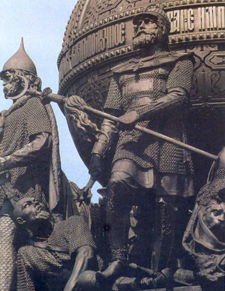- Mamai
-
For other uses, see Mamai (disambiguation)."Mamay" redirects here. For other uses, see Mamay (disambiguation).
Mamai Beqlarbeg Predecessor ? Successor Edigu Issue Khan Mamatsios Born ~1335? Died 1380
Caffa, Golden HordeBurial Şeyh Mamay (today Aivazovske, Kirovske Raion)  Mamai at the feet of Dmitry Donskoi, Millennium Monument in Novgorod
Mamai at the feet of Dmitry Donskoi, Millennium Monument in Novgorod
Mamai (? - 1380) of Borjigin kin, was a powerful military commander of the Blue Horde in the 1370s which is now the Southern Ukrainian Steppes and the Crimean Peninsula.
Mamai became a governor sometime in the second half of 1350s of a territory that later would become Crimean Khanate. During the rule of Berdi Beg (since 1357) Mamai was appointed as beqlar beg - general of the army, minister of foreign affairs, and the head of the supreme court all simultaneously.
Upon the assassination of Berdi Beg by Qulpa in 1359, Mamai associated himself with one of the coalitions to depose Qulpa. During that period of time Golden Horde was in a relative chaos while numerous regional governors were striving to become the Khan. Qulpa eventually was killed by Nawruz Beg who also was assassinated less than a half year later. Mamai who was not a direct descendant of Genghis Khan played a key role in promoting and supporting rival khans in White Horde (western part of Golden Horde). In 1361 he supported Ğabdullah, son of Uzbeg Khan who became a khan in Crimea. Upon the death of Ğabdullah in 1370, Mamai supported Bulak who could only stay in power for couple of years was replaced by his main opponent Urus in 1372.
After being badly defeated by Russians under Dmitri Donskoi first in 1378 at the Battle of the Vozha River and then at the Battle of Kulikovo (1380), Mamai began to assemble a large force to punish Dmitri. But he was defeated by Tokhtamysh (who was of genghisid lineage) on the banks of the Kalka River and fled to Crimea. There he was assassinated in Caffa (Crimea) by the Genoese, who could not forgive the total waste of a military unit of Genoese crossbowmen who were slaughtered by the Russians. The assassination of Mamai paved the way for the next khan to reunify the Golden Horde.
The memory of Mamai has endured for centuries. Contemporary Russian language has an expression "как Мамай прошел" (kak Mamaj prošel), which translates roughly to "it's as if Mamai came through here", used to describe an utter mess.
The burial of Mamai was found by the native Crimean and famous Russian painter Ivan Aivazovsky. Mamai was buried in a village of Şeyh Mamay (today Aivazovske, Kirovske Raion).
Purported descendants
Khan Mamatsios or Mamatzios, Mamatsu (Mamai-son) Macedonie was a supposed son of Mamai. One of his sons, Manzur Kiyat, purportedly escaped to Lithuania, and, serving Grand Prince Vytautas the Great, received the title of Prince of Hlinsk with multiple estates around the modern city of Poltava (Ukraine). These legendary events could have taken place in the 15th century, although the first documented mention of the Glinski princes is made in 1437. Michael Glinski was the most illustrious member of the family: he studied at the German university, took part as a knight in the Italian Wars, was the most powerful man in Lithuania in the 16th century, but later rebelled and run away with his brothers to Muscovy and helped the Russians to retake the city of Smolensk. His niece Elena Glinskaya was married to Vasily III, Grand Prince of Moscow, and Ivan the Terrible was her son.
Preceded by Military Leader of Blue Horde and Golden Horde
1361 – 1380Succeeded by
EdiguCategories:- 14th-century people
- Politics of Muscovy
- Golden Horde
Wikimedia Foundation. 2010.
